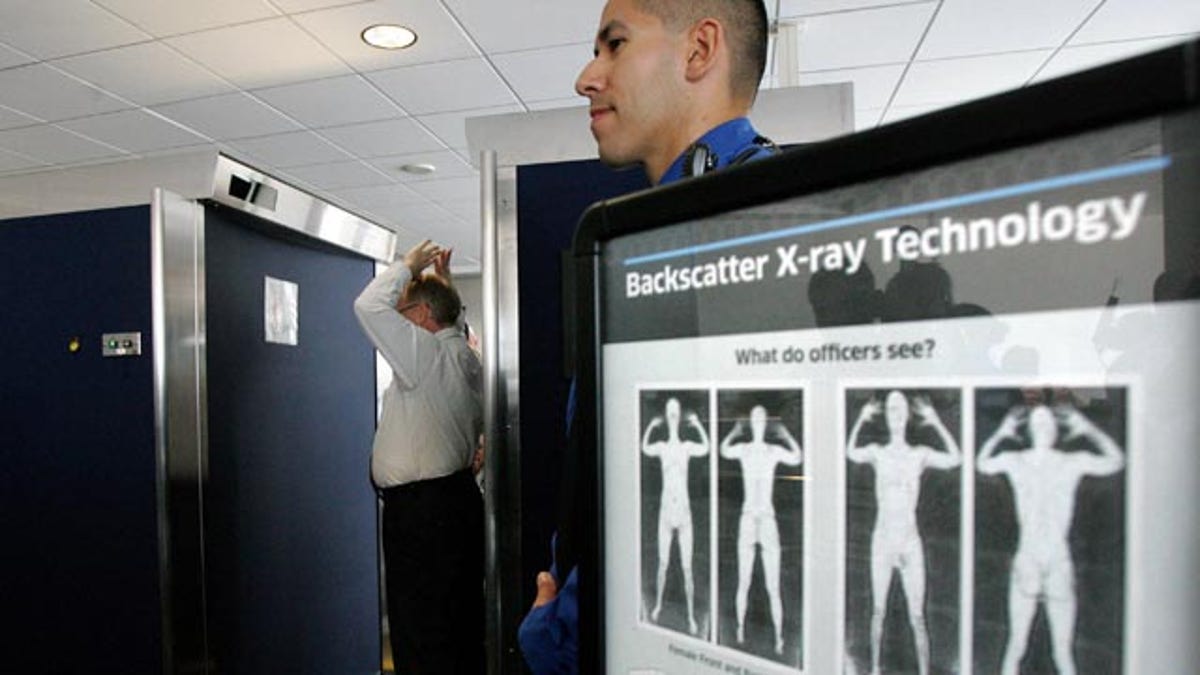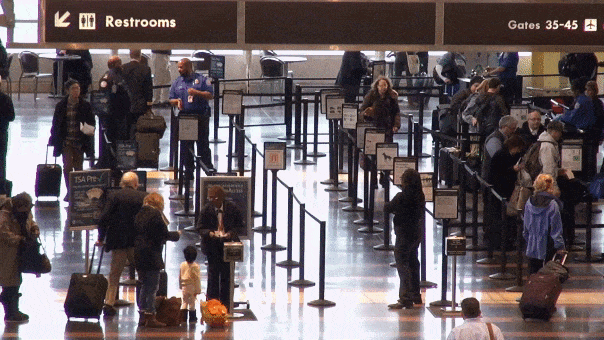
File: Transportation Security Administration employee Anthony Brock, left, demonstrates a new full-body scanner at San Diego's Lindbergh Field. (AP)
Your frequent-flier membership could earn you more than just a free trip, first-class status or upgraded snacks in the lounge area. It could get you through security faster and fully clothed, leaving you more time to grab that last minute, over-priced souvenir.
The Transportation Security Administration on Tuesday launched PreCheck, an expedited screening pilot program that will allow certain travelers to bypass much of the current physical security screening that leaves many fliers frustrated. The program is part of TSA’s effort to focus its attention on lesser known or high-risk individuals, instead of the entire pool of passengers.
“We know the majority of airline passengers are low-risk and this concept allows us to provide expedited screening for a population deemed to be lower of a risk to transportation,” said TSA spokesman Greg Soule.
Who's Eligible?
Not everyone is eligible to be a TSA trusted traveler. Under the free, pilot program, only U.S. citizens who voluntarily provide certain information about themselves are eligible. In its initial phase, the TSA will focus on frequent fliers with Delta and American Airlines.
Also eligible are members of the Customs and Border Protection’s “Trusted Traveler” program, which include Global Entry, SENTRI and NEXUS.
Officials estimate it involves somewhere between 5,000 to 8,000 travelers daily and only those who travel at Hartsfield-Jackson Atlanta International, Detroit Metropolitan Wayne County, Miami International and Dallas-Fort Worth International airports.
How It Works
The airlines have been reaching out to certain frequent fliers, who have agreed to opt-in, or not. Those who have signed on must provide additional information about themselves that the TSA will use to determine if the passenger qualifies.
CBP trusted travelers are assigned a PASS ID, which they must place in the ‘Known Traveler Number’ field while booking their reservations. For frequent fliers, airlines identify them as a PreCheck participant. All that information is then passed to TSA’s Secure Flight system and taken into consideration during the pre-screening processing.
That information will be embedded in the barcode on the boarding pass, and when a TSA agent scans the barcode at the checkpoint, that pre-approved participant could be directed to the designated fast-track lane. But even low-risk people may not be directed to the expedited line all the time.
TSA clearly points out this is not an entitlement program, and “there will be an element of randomness and unpredictability, so individuals won’t be able to game the system.”
Follow the Leader
If the program works, it will likely be expanded. In the meantime, many are pointing to existing, successful government programs, such as the Custom and Border Protection’s Global Entry program.
“We are giving them all the help and advice we can about how we built our trusted traveler program,” said CBP spokesman Brad Benson of the TSA.
Global Entry has been up and running since 2008 and has more than 258,000 members who are enjoying expedited security screening when they re-enter the county. Participants undergo background checks, interviews and fingerprinting before they are put into the system.
“We look for someone with clean backgrounds, no import problems, coupled with people who have regular, legitimate travel,” said Benson.
Once applicants are accepted, their information is linked to their passport. After entering the country, they scan their passport at a kiosk, answer similar questions from the in-flight Customs declaration form, and if there are no further inspections, bypass the long lines.
Benson added, “it’s a big advantage for us security wise, a big advantage to the traveler because they save time and big for airlines because they can process quicker connections for their passengers.”
What Does the Future Hold?
In the past decade, the TSA has added layer upon layer of new security screening, which has left travelers frustrated, but this pilot program has the potential to change the perception of air security, according to travel industry insiders. It could mean pat-downs or full-body scans for the minority, not the majority, of passengers.
“The TSA pilot program gets us away from a one-size-fits-all approach to screening; it should help ease frustrations by making the process quicker and, importantly, contains randomized screening elements to ensure our system is as secure as possible,” said Shane Downey with the Global Business Travel Association.
The U.S. Travel Association calls this a “courageous first step” and says a trusted traveler program is probably “the single biggest thing TSA can do to improve the system as a whole.”
And while TSA won’t speculate on the program’s success, USTA spokesman Erik Hansen told FoxNews.com, “it will come when enough people are enrolled in a trusted traveler program to expedite the screening process at major U.S. airports.”
Travelers can only hope there is light at the end of the shoe closet, otherwise known as airport security checkpoints.








































